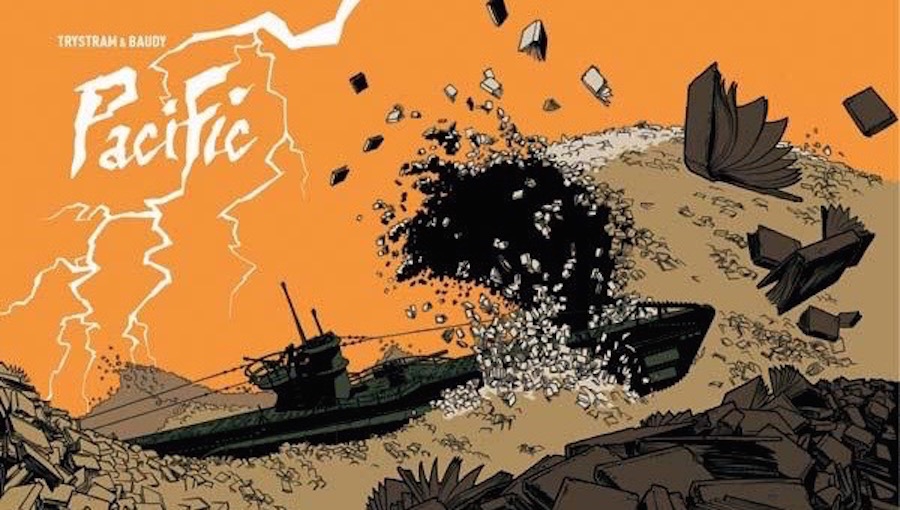Romain Baudy and Martin Trystram’s Pacific left me with the uncanny feeling that there’s something I missed. The graphic novel is a tale of the crew of a U-boat near the end of the Second World War, and one that begins in a mundane enough manner: a new crew member comes aboard, learning the ropes, being hazed by his crewmates as he’s introduced to the tight, unprivate quarters he’ll be restricted to in the coming weeks. One of his crewmates – though each is rendered as a recognizable individual, names are hard to come by – discovers a banned book amongst the newcomer’s belongings. Nazis were serious about their book banning, you know.
The book is disposed of, but it reappears. (That much the copy on the back cover will tell you, so it’s not really a proper spoiler.) This looks like (and is billed like) a hard shift from The Enemy Below to The Twilight Zone, but it…isn’t. I don’t feel like I can say more than that without spoiling things more than the back cover copy already does, but it’s hard to finish this book and not feel like the almost sinister way the advertising paints the situation is a bit misleading.
Of course, I hate to judge a book by its marketing campaign, and on its own, Pacific is a brief and, at times, affecting tale of wartime camaraderie. The crew of the U-boat is swept up in a war that, for them, often seems very far away, and yet they are risking their lives every moment just being in one of Germany’s famed silent hunters. And, if your exposure is mostly to American-made WWII films and media, it’ll be easy to forget that these guys are the “villains” of the conflict. They aren’t the trim, precise Nazi officers of so many films. They aren’t evil, even if they may, at times, be desperate. They’re locked into a situation none of them particularly like, but they also feel they have to believe in it.
Oddly enough for a story that is, ostensibly, about the way a single written volume can change the lives of the U-boat’s crew, Pacific is at its best when it stops talking and just shows. At several points throughout, the story proceeds across several pages with no text whatever, just imagery: the U-boat being tossed in a storm, the crew fighting off enemy airplanes, death, and near misses. These moments feel sincere; these moments convey the loneliness, the desperation, of these men’s situation. These moments sell the connectedness of the crew better than any of the scenes where they interact verbally. And they make us feel sorry for them: in control of one of their time’s most significant war machines, and yet helpless against the tide.

